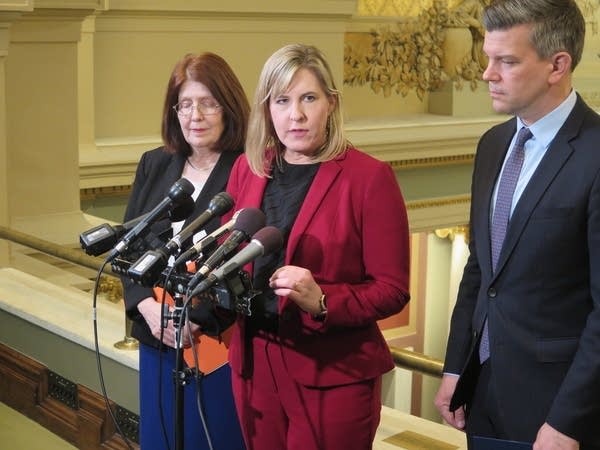Legislature to meet again under COVID-19 restrictions

Go Deeper.
Create an account or log in to save stories.
Like this?
Thanks for liking this story! We have added it to a list of your favorite stories.
Minnesota lawmakers will reconvene Thursday to vote on a request from Gov. Tim Walz for another $350 million for the state’s coronavirus response.
“It’s critical for us to be able to manage this response,” said Minnesota Management and Budget Commissioner Myron Frans. “You look at the corrections system. If something were to happen and there was a disease outbreak in one of the correctional facilities that would cause a lot of uncertainty and extra costs and overtime costs. If you look at housing and homelessness issues are really critical now. If you look at food insecurity.”
The governor wants $200 million for a floating coronavirus response fund. In some ways, they’re putting up a number in the dark.
“We don’t know what the total amount may end up being,” Frans said. “We hope this is enough. We hope this is more than enough.”
Turn Up Your Support
MPR News helps you turn down the noise and build shared understanding. Turn up your support for this public resource and keep trusted journalism accessible to all.
Minnesota House Speaker Melissa Hortman, DFL-Brooklyn Park, said the spending bill is likely to include some oversight language — either requiring preapproval for some expenses or at least after-the-fact review.
But she doesn’t want to tie the governor’s hands too much.
“There is a need for the governor to be able to act quickly in the time of an emergency and to not have anything that would be ideological or petty concerns slowing down the providing of relief in places that it’s needed,” Hortman said.
There are other pots of money in the Walz request with specific destinations.
That includes up to $500 per family in emergency payments to welfare recipients, assistance to food shelves, money to bolster homeless shelters and to pay for motel rooms in the event ill people without a home need to be isolated.
There’s also about $30 million for emergency child care assistance grants.
It’s welcome news to Ann McCully, executive director of Child Care Aware of Minnesota, which works with centers and home day cares around the state.
Many providers are on the edge at a time they’re being asked to do more, McCully said.
“Schools were asked to step up and fund our school-aged children with existing funding streams. Family child care homes and child care centers did not have an existing funding stream. So, we need to make sure they receive some kind of remuneration for doing that.”
McCully said it’s imperative the money come with as few strings as possible.
Sen. Eric Pratt, R-Prior Lake, is just as happy to see millions of dollars in small business assistance. A new program provides forgivable or no-interest loans to as many as 5,000 companies upended by coronavirus commerce restrictions.
"We need and want these guys to stay vibrant,” Pratt said. “And we want them to come back from this ready to hire people back and ready to continue on."
When lawmakers do return, Hortman said extra precautions will be in place.
There will be fewer members in the House and Senate at once — and even in the Capitol. Lawmakers in the House and Senate will be asked to come in one door and leave from another, and keep 6 feet of distance from their colleagues and staff.
Hortman is working with top Republicans to seek volunteers to be absent from session.
“We are asking members of our caucus to take one for the team and stay home and keep any associated germs they have with them in their home,” she said.
There are 134 House members. Ninety of them are needed to suspend rules and pass a bill in quick fashion. Hortman said there will be a few more than that on hand just in case.
But Hortman said she can’t compel elected officials to sit out.
Going forward, Hortman said the House is exploring remote voting options in case the coronavirus situation worsens. That would prevent the Legislature from seizing up if many lawmakers get sidelined by the coronavirus.
Sen. Paul Anderson, R-Plymouth, knows he won’t be there. He’s on self-quarantine after coming in contact with someone known to have COVID-19.
Anderson has sequestered himself in his basement to steer clear of his wife and children.
“I’ve got laptops, iPad, TV, everything in front of me and I just continue to do conference calls, Zoom, Skype and emails and texts.”
But Anderson can’t vote if he’s not at the Capitol, which he said is personally frustrating but the right call for now.
“I want to make sure that if I do test positive in the days to come that I am doing my best to protect others,” he said.


